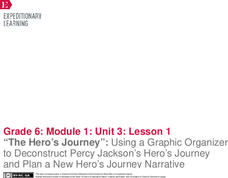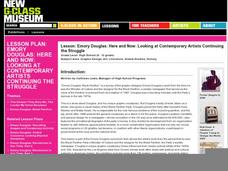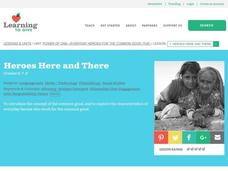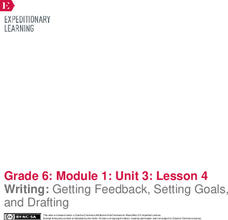Maryland Department of Education
The Concept of Diversity in World Literature Lesson 5: The Tragic Hero
Should identifying a tragic hero be based on a universal definition or a definition based on the morals and values of a specific culture? As part of a study of Things Fall Apart, class members read Sylvia Plath's "Colossus" and then...
Prestwick House
Star Wars and the Hero's Journey
Is Luke Skywalker the archetype of a literary hero? Follow the path of the Hero's Journey with an engaging lesson that details the plot structure, applies it to Star Wars: A New Hope, and invites class members to choose their own example...
EngageNY
“The Hero’s Journey”: Using a Graphic Organizer to Deconstruct Percy Jackson’s Hero’s Journey and Plan a New Hero’s Journey Narrative
Time to go on a journey! Using a graphic organizer, scholars deconstruct Percy Jackson's hero's journey from the Rick Riordan novel, The Lightning Thief. Next, they begin planning their own hero's journey narrative, creating a profile of...
Curated OER
Lesson: Heroes: Then and Now
What is the difference between Hercules and Spiderman? Both are heroes, right? Kids identify the characteristics that make a hero, and analyze the differences between heroes of long ago and today. They write creative stories describing a...
EngageNY
“The Hero’s Journey”: Analyzing a Model Narrative and Continuing to Plan a New Hero’s Journey Narrative
Many elements go into an engaging narrative story. Using a helpful resource, scholars analyze a model narrative and deconstruct it using a graphic organizer. Next, they apply their learning from the model to update their plans for their...
EngageNY
Mid-Unit Assessment and Establishing a Context for My Hero’s Journey Narrative
How do writers engage their readers in a story? Pupils consider the question and use the informational text, "The Hero's Journey" to justify their plan for their own fictional narrative. To that end, scholars write an explanatory...
EngageNY
Writing: Analyzing the Conclusion of “The Golden Key” and Drafting a Compelling Conclusion for the Hero’s Journey Narrative
There's something different here. Using a note-catcher, scholars determine the differences between the conclusion of a piece of analytical writing and the conclusion of a narrative. Next, they begin drafting their own narrative...
EngageNY
End of Unit Assessment: Final Draft of Hero’s Journey Narrative
All journeys must come to an end. Using the final lesson in the series, pupils analyze a model narrative for use of transitional words and phrases. Next, they apply their learning to their final drafts of their hero's journey narrative.
EngageNY
Writing to Show, Not Tell: Dialogue, Sensory Words, and Strong Action Verbs
Consume, gobble, devour ... serving up strong verbs! Writers focus on using dialogue, strong action verbs, and sensory details in their writing. After analyzing a model narrative, they apply their learning to their own hero's journey...
Curated OER
Identifying Supporting Evidence from a Text - What is a Hero?
Pupils define hero and identify supporting evidence in a text. They complete a hero diagram worksheet and watch a video about a little boy from China who acts as a hero. Additionally, they complete the Ping Hero evidence worksheet and...
EngageNY
The Hero’s Journey, Part 1: What is a Hero?
That was heroic! Scholars quickly look over What is a Hero to determine and discuss the structure of the text. They then read the introduction and Act 1 closely to find the gist and annotate the text. They circle unfamiliar words and...
Curated OER
Create a Holiday for Your Favorite Hero
Students create a holiday for a hero. The person may be someone in history who is not currently honored with a holiday, another famous person, a family member, a friend, or someone else they admire.
Curated OER
Tears of Joy Theatre Presents Anansi the Spider
Accompany the African folktale, Anansi the Spider, with a collection of five lessons, each equipped with supplemental activities. Lessons offer multidisciplinary reinforcement in English language arts, social studies, science, and arts...
Art Institute of Chicago
Lesson Plan: A Writer’s Odyssey
Looking for a fresh approach to an end-of-unit project for The Odyssey? Check out a resource that has class members write their own hero's journey short story and then craft an illustration that depicts their tale. Apollonio di...
Penguin Books
A Teacher's Guide to the Signet Classic Edition of Beowulf
Beowulf, the Old English epic hero, comes alive again in the activities found in a teacher's guide designed to accompany a reading of the classic poem.
EngageNY
Building Background Knowledge About the Hero’s Journey, Part 2: Acts 2 and 3 Plus Focusing on Key Vocabulary in “The Hero’s Journey”
It's all in the details. Scholars read acts two and three of The Hero's Journey and collect important details from the text. They share their notes with their peers and listen for key words from the story. They then turn their attention...
EngageNY
Selecting Evidence and Partner Writing: Aligning “The Hero’s Journey” and The Lightning Thief (Chapter 5)
Around and around we go! Scholars work in groups to connect The Hero's Journey and The Lightning Thief with a Carousel of Quotes activity. They then independently reflect on the two texts and answer questions about how they connect to...
EngageNY
Writing with Evidence: Percy and the Hero’s Journey (Chapter 7)
Read, set, write! Scholars participate in the first fully independent writing task of the unit as they write about how Percy’s experience in The Lightning Thief aligns with The Hero’s Journey. To begin their writing, they complete a...
Curated OER
Everyday Heroes
Here is a nice way to allow your pupils to recognize important people in their lives. After a class discussion that focuses on the many unrecognized everyday heroes, kids make a list of their everyday heroes. Learners create an award for...
Curated OER
Lesson: Emory Douglas: Here and Now: Looking at Contemporary Struggle
After looking into the life, art, and social contributions of artist Emory Douglas, learners analyze several social art pieces. They use Emory Douglas as an example of social art, then consider 10 other pieces. They write a paper...
EngageNY
Grade 10 ELA Module 4: Unit 2, Lesson 19
A tragic play includes imperfect heroes, pity and fear, and a fatal flaw. Scholars analyze Shakespeare's Macbeth as an example of the tragedy genre. Pupils demonstrate understanding by completing a Quick Write discussing how Shakespeare...
Curated OER
Heroes Here and There
Students explore the concept of philanthropic heroes. In this everyday heroes activity, students compare and contrast media and famous heroes with everyday heroes. Students discuss heroes in small groups and then come together in large...
PBS
Catch-22: What It Means to Be a(n Anti)Hero
Catch-22, Joseph Heller's send-up of military organizational bureaucracy, provides readers with an opportunity to consider the importance of the anti-hero. Class members fill out a worksheet comparing and contrasting the qualities of...
EngageNY
Writing: Getting Feedback, Setting Goals, and Drafting
Why is it important to set goals as a writer? Scholars process feedback from their mid-unit assessments, writing down their strengths and weaknesses on index cards. Next, pupils use the feedback to begin drafting their hero's journey...

























